
- Home
- Brand
- Armani (36)
- Augarten (45)
- Beswick (128)
- Breyer (113)
- Capodimonte (145)
- Cybis (51)
- Franklin Mint (83)
- Goebel (36)
- Hagen-renaker (99)
- Herend (64)
- Hutschenreuther (77)
- Kaiser (41)
- Lenox (160)
- Lladro (49)
- Lladró (226)
- Nymphenburg (36)
- Rosenthal (61)
- Royal Copenhagen (37)
- Royal Doulton (62)
- Royal Dux (38)
- ... (2239)
- Item Length
- Material
- Bone China (14)
- Brass, Porcelain (3)
- Ceramic (74)
- Ceramic & Porcelain (228)
- Ceramic / Porcelain (3)
- Ceramic / Pottery (5)
- Ceramic, Porcelain (35)
- Clay (3)
- Cold Cast Porcelain (4)
- Fine China (3)
- Glazed Ceramic (3)
- Metal, Porcelain (3)
- Porcelain (2193)
- Porcelain / Ceramic (6)
- Porcelain / China (69)
- Porcelain And Metal (7)
- Porcelain Bisque (4)
- Porcelain, Ceramic (4)
- Porcelain, Resin (3)
- Porcelain, Wood (17)
- ... (1145)
- Origin
- Subject
- Animals (6)
- Boy And Horse (5)
- Carousel (12)
- Carousel Horse (13)
- Carriage (6)
- Cinderella (26)
- Don Quixote (6)
- Dresden (12)
- Girl (6)
- Horse (1285)
- Horse & Carriage (6)
- Horse & Rider (6)
- Horse And Carriage (6)
- Horse And Sleigh (6)
- Horse Drawn Coach (6)
- Horses (19)
- Men (10)
- Seahorse (5)
- Unicorn (13)
- Women (69)
- ... (2303)
- Type
- Art (3)
- Carousel Horse (3)
- Chess Piece (3)
- Figure (9)
- Figurine (2183)
- Figurine / Vase (2)
- Figurines (15)
- Figurines & Statues (54)
- Horse (3)
- Horse Figurine (3)
- Horses / Foals (3)
- Lamp (2)
- Ornament (3)
- Porcelain Figurine (12)
- Sculpture (61)
- Statue (59)
- Statues (2)
- Table Vase (4)
- Unicorn (2)
- Vase (3)
- ... (1397)
Vintage Foal Horse Original Rosenthal Albert Hussmann Porcelain Figurine Decor
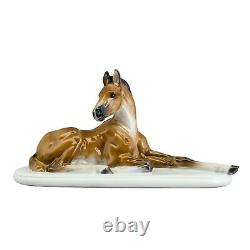
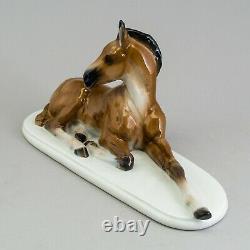
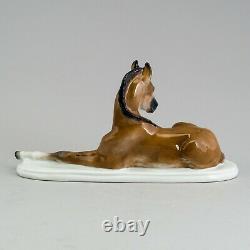
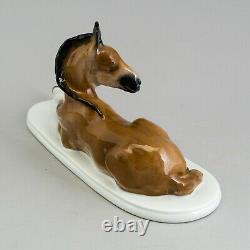
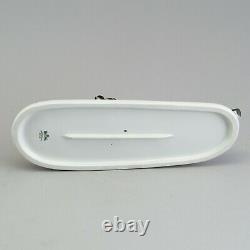
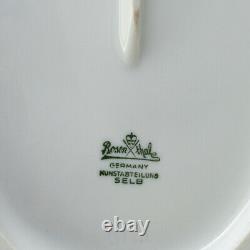


Vintage Foal Horse Original Rosenthal Albert Hussmann Porcelain Figurine Decor. He studied at the Academy of Fine Arts in Berlin. His statues were featured several times in the Great Berlin Art Exhibition. The first Rosenthal company - a factory decorating porcelain, was started in 1879 in Southern Germany. It was founded by Philipp Rosenthal in Erkersreuth near Selv, Bavaria.
By 1890 the factory moved to Selb. During the next 10 years the company was expanding extensively and several factories were opened or taken over.
Art departments for ceramics were established in 1910 and 1920. Following the foundation of a glassworks in 1920, fruitful co-operation between a lot of contemporary glassartists and designers began - among those the Danish artist Bjorn Wiinblad.
Philipp Rosenthal was forced to leave Germany during the war, being jewish, but Philip Rosenthal (Philipp's son) followed in his fathers footsteps. The son set new standards for production and development. He wanted the avantgarde applied in the porcelain designs.The company has expanded every year ever since. Around their centenary in 1979, 8500 people were employed by Rosenthal globally.
It is said, that the Rosenthal's successis due to the father and his sons always paying great attention to marketing techniques, as well as their big set-up and development of koncession-shops and studio-departments in the postwar-years. Co-operating with Bjorn Wiinblad, Rosenthal has produced several series of plates, in porcelain as well as in glas. Among others the porcelain plate series "Aladin", the glass-plate series "The Parables", the porcelain plate series "Christmas Carols", the porcelain plate series "Christmas plates" and the glass plate series "Christmas plates".
By 1997 Waterford Wedgwood bought the controlling interest in Rosenthal. Today Rosenthal is an independent member of the Waterford Wedgwood Holding Group - the worlds biggest manufacturers of "Table Culture" products.In 2000 the German porcelain factory Hutschenreuther was bought by Rosenthal. The figurine is in excellent, undamaged condition. We will respond within 24 hours. This item is in the category "Collectibles\Decorative Collectibles\Sculptures & Figurines". The seller is "pazar1990" and is located in this country: LV.
This item can be shipped worldwide.- Size: Width: 32.0 cm.
- Artist: Rosenthal, sculptor: Albert Hussmann
- Country/Region of Manufacture: Germany
- Department: Girls, Boys, Teens, Adults
- Style: Art Deco
- Material: Ceramic & Porcelain
- Theme: Art
- Original/Reproduction: Original
- Pattern: Decor
- Type: Statue
- Features: Art
- Number in Pack: 1
- Color: Brown
- Year Manufactured: 1944
- Subject: Horse
- Finish: Glazed
- Room: Any Room
- Character Family: Foal
- Collection: Animals
- Occasion: All Occasions
- Brand: Rosenthal
- Time Period Manufactured: 1944

